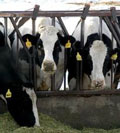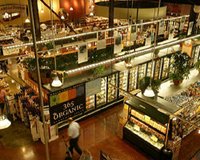
Cow manure may not be an obvious energy alternative, but it is fueling farms in Vermont. Central Vermont Public Service started a program called Cow Power, which uses methane from cow dung to generate electricity.
Methane, a green house gas that traps 20 times more heat than carbon dioxide, can significantly contribute to global warming. Trapping it and using it for fuel can help to reduce energy costs and potentially slow climate change.
Some dairy farms install a machine that scrapes floor of the barn, collecting waste from the cows. The manure is then put into a 100 degree holding tank, called an anaerobic digester, where bacteria that is naturally found in the cows’ stomachs continue to digest it like an enlarged stomach.
Over the course of three weeks, methane is collected from the manure in the sealed tank and sent to a natural gas engine where it is used to create electricity. Unless it leaks, there is no reek. And the heat from the engine helps to keep the digestion tank hot.
Some of the remaining waste is in liquid form while the rest is solid. Farmers can spread liquid over the farm fields as fertilizer. The now odorless solid can replace sawdust that is spread on the floor of the bar and used as bedding for the cows.
One cow can produce up to 30 gallons of waste a day, which can light two 100-watt light bulbs 24 hours a day, according to the website. Maybe best of all, the fuel is renewable.
Cow power not only supplies farms with energy, it can also provide energy to other institutions. Green Mountain College announced in October that it would purchase 50 percent of its energy from cow power.
Although cow manure may not be an energy alternative for everybody, it certainly is an option that doesn’t stink.




